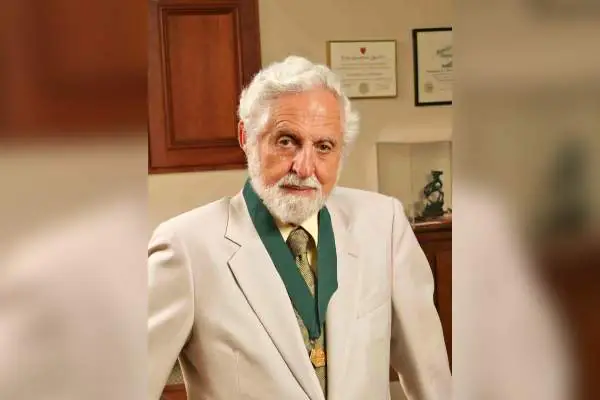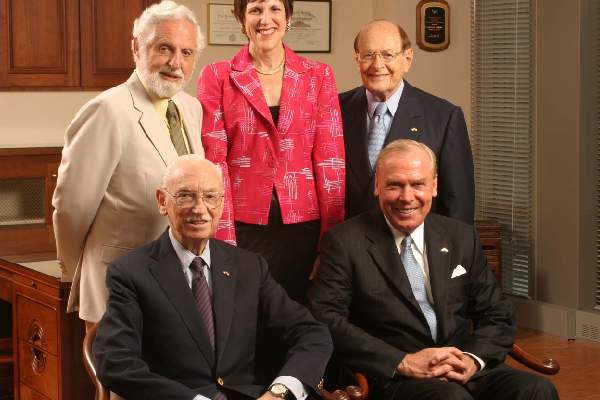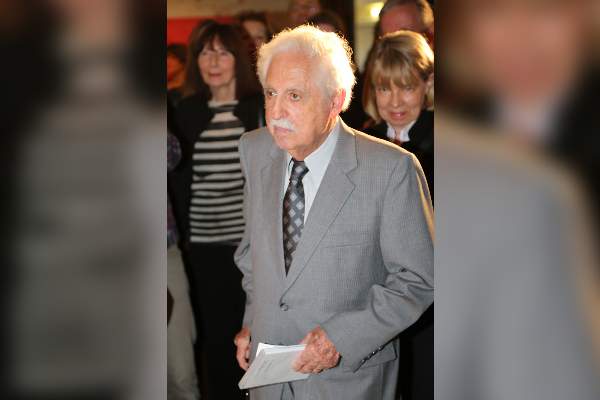Carl Djerassi Biography: An Extraordinary Life of The Father of “The Pill”

Carl Djerassi Biography. Image Source: Large Norwegian Encyclopedia
- Full Name Carl Djerassi
- Age 91 yrs
- Birth Date October 29, 1923
- Country America
- Relationship Status Divorced
- Spouse Diane Middlebrook (m. 1985–2007), Norma Lundholm Djerassi (m. 1950–1976), Virginia Jeremiah (m. 1943–1950)
- Nationality Austrian-born Bulgarian-American
- Profession Pharmaceutical Chemist, Novelist, Playwright
- Children Pamela Djerassi, Dale Djerassi
- Awards and honors Edinburgh Medal (2011), Foreign Member of the Royal Society (2010), Othmer Gold Medal (2000), etc.
- Education PhD in organic chemistry(1945), University of Wisconsin–Madison
- Death Date January 30, 2015
Do you know over 1 billion women of reproductive age (15-49) have used some method of contraception since 1994?
Medical reports suggest that over 300 million women have used oral contraceptives over the course of 25 years. While oral contraceptives remain a popular form of birth control, today, in this article, we will be diving into its mastermind creator, Carl Djerassi biography.
Djerassi was a man of exceptional talent with diverse knowledge in pharmaceuticals, literature, and organic chemistry. So, dear readers, you might want to stay with us till the end and learn more about the man who got the nickname “The Father of the Pill.”
Escaping Nazis, Arriving in the U.S, and Earning a Ph.D
Carl Djerassi was born on October 29, 1923, in Vienna, Austria, to a family of Jewish heritage and spent a year as an infant in Sofia, Bulgaria, the home of his father. Djerassi’s father, Samuel Djerassi, was a prominent physician, and his mother, Alice Friedmann, was a pharmacist.
After his parents’ divorce, Carl moved to Vienna with his mother, but he also spent summers with his father in Bulgaria. Growing up in a cultured and intellectually stimulating environment, young Carl developed a fascination for science and the arts. However, his idyllic upbringing was soon disrupted by the rise of Nazi sovereignty in Europe.
In 1938, as Hitler’s forces began their march across Europe, the Djerassi family realized the imminent danger they faced due to their Jewish background. So, Carl’s father briefly remarried his mother, Alice, to flee from Austria to Bulgaria. Fearing for their lives and safety, they made a difficult decision to flee their homeland escaping deportation to Nazi concentration camps.
With Austria under Nazi control, the family lived in Bulgaria for a few years, and this time Djeraassi attended the American College of Sofia, becoming fluent in English.
Djerassi, with his mother, arrived in the United States in December 1939 without a single penny. Their journey to the U.S is a tale of two fortunate survivors, among others, who managed to escape the horrors of the Holocaust. His father later emigrated to the United States and practiced as a physician in Pennsylvania and West Virginia. Meanwhile, Carl’s mother eventually found a job as a pharmacist in a group practice in New York.
Carl was 16 when he first arrived in the U.S. and later attended Newark Junior College. Further, he went on to study chemistry at Kenyon College, graduating summa cum laude. Afterward, he spent one year at CIBA, New Jersey, a multinational pharmaceutical corporation. Then in 1945, Carl enrolled at the University of Wisconsin-Madison and earned his Ph.D. in organic chemistry.
Harmonizing the Revolution: Master Chemist Behind the Pill
While working at CIBA in the early 1940s, Carl was developing a drug that could be used in the treatment of asthma and hay fever. The drug was Carl’s first patent and one of his first commercial antihistamine drugs that treated allergic rhinitis, the common cold, influenza, and other allergies.
From 1949 until 1951, Djerassi became associate director of research at Syntex in Mexico City. At Syntex, the three chemists Carl Djerassi, Luis Miramontes, and George Rosenkranz had synthesized the first orally highly active progestin norethisterone in 1951. The progestin compound called norethindrone was a key component of the birth control pill.
Therefore, Carl Djerassi is one of the pioneers in the development of the first oral contraceptive pill. For his most notable scientific achievement, he is often referred to as the Father of The pill. However, Djerassi didn’t invent the commercial birth control pill; he was just one of many scientists working over decades.

Carl Djerassi Biography. Image Source: Wikimedia Commons
The successful development of the pill revolutionized reproductive health and had a profound impact on society by giving women greater control over their reproductive choices.
Apart from his work on the pill, Djerassi made several other significant contributions to the field of organic chemistry. He conducted research in the area of stereochemistry, natural product synthesis, and mass spectrometry. This breakthrough allowed women to control their reproductive choices like never before, sparking a social revolution.
The pill’s widespread use had significant economic and societal repercussions. It separated intercourse from reproduction, giving women previously unheard-of control over fertility. Couples were able to plan pregnancies and control family size. Likewise, women were able to plan their academic and professional careers.
ALSO READ: Dr. Michael Ellis DeBakey Biography, a pioneer in the development of an artificial heart.
Entrepreneurship and Continued Research Intersections of Science and the Arts
After his groundbreaking work on the birth control pill, Djerassi’s career took diverse paths. He delved into entrepreneurship and founded Zoecon Corporation, a company dedicated to eco-friendly pest control solutions. Additionally, he held academic positions, including at Stanford University, where he continued to make valuable contributions to the field of organic chemistry.
In addition to his scientific work, Djerassi had a passion for literature and the arts. He wrote poetry, plays, and novels. He was an accomplished playwright and wrote several successful plays that explored the intersection of science and society. He wrote books, plays, and 1,200 scientific articles; taught at universities for five decades; created an artists’ colony in California.

Carl Djerassi Biography. Image Source: Wikimedia Commons
A self-described “intellectual polygamist,” Carl began his career as a writer and playwright when he was in his early 70s. He debuted with a novel titled Cantor’s Dilemma in 1989. One of his most successful plays, titled Oxygen, was published in 2001, and Foreplay was published in 2011.
Djerassi’s interests extended beyond the realm of science. He had a deep appreciation for literature and the arts, which he seamlessly integrated into his life. He explored the intersections between science and the humanities, ultimately becoming a renowned playwright and author. His plays and novels often tackled complex themes, including the ethical implications of scientific advancements and the human side of scientific discovery.
Similarly, you might want to read about Rebecca Lee Crumpler, the first African-American woman M.D. in the U.S.
Legacy and Passing
Carl Djerassi’s legacy is deeply intertwined with his contributions to both science and the arts. His work on the birth control pill transformed reproductive rights and women’s health. His dedication to exploring the connections between science and the humanities also left a lasting impact.

Carl Djerassi Biography. Image Source: Wikimedia Commons
His contributions to science, literature, and societal discussions continue to be remembered and celebrated by the scientific and artistic communities alike. In 1968 he founded a company called Zoecon which significantly contributed to his fortune and helped him earn numerous awards. Let’s take a look at some of his accolades.
| Year | Awards |
| 2011 | Edinburgh Medal |
| 2010 | Foreign Member of the Royal Society |
| 2009 | Alecrin Prize |
| 2008 | Grand Decoration of Honour in Silver for Services to the Republic of Austria |
| 2005 | Lichtenberg Medal of the Göttingen Academy of Sciences |
| 1975 | Perkin Medal |
| 1972 | Scheele Award |
Table Source: Online Publications
Unfortunately, Carl Djerassi regrettably passed away on January 30, 2015, at the age of 91, as a result of liver and bone cancer complications. But his influence on literature, science, and public conversation endures. His experience serves as an example of the human spirit’s tenacity and the transformational potential of learning, invention, and creativity.
Carl Djerassi’s biography is multi-faceted and enduring. His groundbreaking work on the birth control pill revolutionized reproductive health, empowering women and reshaping societal norms. Beyond his scientific accomplishments, his exploration of the connections between science and the arts enriched both fields, encouraging interdisciplinary conversations.
The Economist. (2015, February 5). Synthesizing revolution. The Economist.
Carl Djerassi. (2022, June 16). Store Norske Leksikon.
Djerassi, Carl 1923– | Encyclopedia.com. (n.d.).
Hayman, S. (2017, November 30). Carl Djerassi obituary. The Guardian.
Science History Institute. (2023, June 7). Carl Djerassi | Science History Institute.
Ball, P. (2015). Carl Djerassi (1923–2015). Nature, 519(7541), 34.
Did you notice an error ?
Please help us make corrections by submitting a suggestion. Your help is greatly appreciated!











